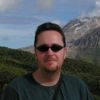
Patrick Smith
- Course: PhD in Volcano Seismology
- PhD title: Attenuation of Volcanic Seismic Signals
- Year of graduation: 2010
- Job title: Research Fellow
- Company: UWI Seismic Research Centre
Why did you choose to study for a PhD?
Whilst studying for my Masters (MRes) degree at the School of Earth and Environment in Leeds, I was lucky enough to have the opportunity to work with my future PhD supervisor, Prof. Jurgen (Locko) Neuberg. I carried out some research on volcano-seismology for my masters' project, which included a visit to La Reunion island where he was on sabbatical. This led to the chance to stay in Leeds and continue my studies at PhD level. So a combination of interest in the subject, the opportunities for travel, the person who I would be working with as well as the School and the city itself were all factors in my decision to study for a PhD.
What have you done since you graduated?
Since graduating I have taken up my role as a Research Fellow in Volcano Seismology at the Montserrat Volcano Observatory (MVO). I am employed by the Seismic Research Centre, part of the University of the West Indies in Trinidad, but live and work in Montserrat. As a seismologist, I am responsible for running and maintaining the MVO network of seismic stations and interpreting the real-time data in terms of the level of volcanic activity. I also plan to carry out my own research into various aspects of volcano seismology.
Has your degree been useful to you in finding work?
Yes! I visited Montserrat and MVO several times throughout the course of my PhD. In 2009 I took 3 months out from my PhD studies to fill in as seismologist here – an opportunity which eventually led to me securing a full-time contract after finishing my studies. Also, attending and presenting my research at several major international conferences gave me opportunities to meet many people from around the world carrying out research in my area – networking is always good for potential future employment!
What are your long-term career goals?
I have just begun a 3-year contract, so will be at MVO for the foreseeable future. Longer term I hope to continue to work in my current field of volcano-seismology, either from the monitoring side in an observatory or in a more research-based role with an academic institution.
What would you say to someone else who may be considering studying a PhD at SEE?
The school has a brand new building, top-class facilities and an excellent national and international reputation for research – particularly in my field of geophysics, and specifically volcano-seismology. All of these are good reasons to consider Leeds as your choice for postgraduate research. Try to make the most of any opportunities for fieldwork, travel, conferences and chances to discuss your research – you never know where it might lead!

